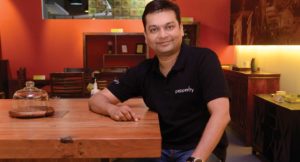For becoming india’s largest branded network of budget hotels across 86 cities in no time.
POORNIMA KAVLEKAR
Operating with an asset light strategy, OYO Rooms is a market place that offers standardized, predictable staying experience across properties. The company partners with hotel owners, brings in standard operating procedures, re-brands or co-brands the property, and then finds customers. In a very short timeframe, it has become India’s leading branded network of budget hotels operating in more than 86 cities, with per room rentals starting at Rs. 999 and going up to Rs. 5000. Its business model allows it to scale exponentially. However, for a property to be branded OYO, it has to conform to prescribed standards set by the company. The company is also very technology focused and integrates it across its business processes. To name a few focus areas, the company’s new-age mobile app enables booking of a room in three clicks and the customer can order room service through the app. Every property is equipped with tablets which enables the property managers to manage the customer engagement from check-in to check-out.
The company has also developed several in-house processes to enable a streamlined execution of tasks. For instance, its expansion processes enables entry into a city within just 3-5 days of signing an agreement.
In August 2015, right before Startup50, OYO raised US $100 million in a funding round led by the Nikesh Arora led Softbank. Prior to that the company had raised Rs. 180 crore from several investors including Lightspeed Venture Partners, Sequoia, Greenoaks Capital and DSG Consumer Partners.
And one more thing; OYO’s founder, Ritesh Agarwal, started the company when he was 20 years old and he’s never gone to college.
A strict open door culture: Anyone and everyone in the leadership is approachable. Block them in the hallway or pull them into a room. Everyone is ready for a chat
Regular townhalls: Townhalls are held every month. This helps the company to disseminate information and update the employees on progress. This also gives the employees a chance to be heard in a larger forum
Brainstorming sessions: The CEO makes it a point to schedule short sessions with every team, frequently. These sessions are typically charged, full of energy and creativity – understand developments, disseminate ideas, take in ideas etc.




